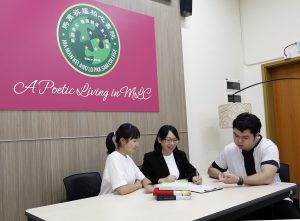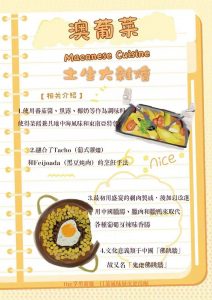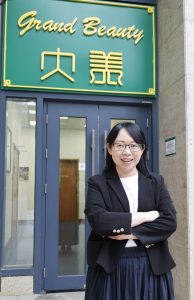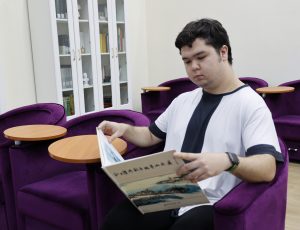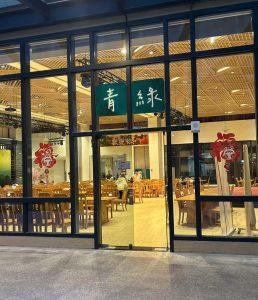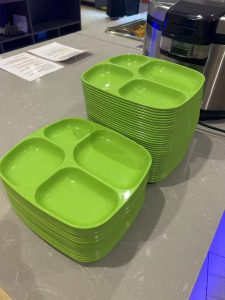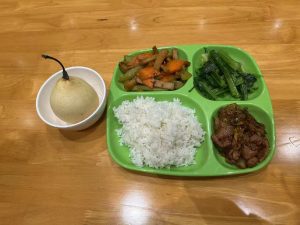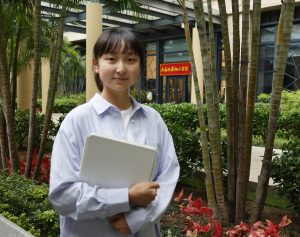In Ma Man Kei and Lo Pak Sam College (MLC) at the University of Macau (UM), Dr Vénus Viana stands out as a food culture decoder. The MLC resident fellow combines her deep historical insights with her professional nutrition knowledge to offer a distinct perspective on the daily dining scenes in the college dining hall. With her keen observations, Vénus uncovers layers of significance that others may overlook. For example, when a Macanese student points out the absence of turmeric powder in an African chicken dish, Vénus sees it as a reflection of the rich, multicultural fusion that characterises Macanese cuisine. When a fitness enthusiast eats seven eggs in one meal, she interprets it as a manifestation of modern dietary myth. Similarly, Vénus views wartime food rationing not just as a matter of supply and demand, but as a meaningful story about the humanities. At MLC, the dining tables become platforms where Vénus engages students in discussions about nutrition, using recipes as her teaching materials. Under her guidance and interpretation, students’ dietary choices transform into a cross-temporal and cross-cultural dialogue.
The dining hall rich with the aroma of history
Last semester, something interesting appeared in the dining hall of one of UM’s residential colleges. Instagram-style recipe notes featuring Macanese cuisine were posted on a display board. These notes not only provided cooking tips but also sparked a conversation about cultural flavours. Leading this culinary exploration was Joel Sousa Nunes, a first-year student at MLC, and his peers.
Vénus recalls how this project began: ‘One day, Joel seriously told me that the African chicken he had at another college did not have turmeric powder. He said it was like a Portuguese egg tart without caramel—it had lost its soul.’ Joel, a Macanese student majoring in English education at UM, captured the essence of Macanese cuisine with his discerning palate. Vénus, Joel’s college resident fellow, was impressed by his insightful understanding of food tastes. She therefore organised a ‘dialogue on the tip of the tongue’ between Joel and the college’s catering supplier. The dialogue not only improved the dish but also inspired students to start a special project: transforming the dining hall into a showroom of Macanese cuisine.
UM promotes a dining policy across the university’s residential colleges, which allows students to understand and appreciate cultural differences through diverse cuisines. Pointing to the recipe notes, Vénus explains, ‘When Joel teaches other students that tacho is a Macanese stew made with locally cured meats, sausages, and duck, and prepared using Portuguese cooking techniques, the dining table becomes a space for cultural integration.’ Under Vénus’s guidance, Joel also designed a Macanese cuisine activity for the residential college education experiential learning programme ‘Empowering Your Future: Culture Immersion & Opportunity Exploration Experience in Macao’, an initiative UM organised for international students. To prepare, Joel researched historical records and created presentations to explain to international students the migration influences on Macanese dishes. For example, he showed how a Macanese chicken dish (galinha à portuguesa) incorporated Southeast Asian coconut milk, a unique creation derived from the era of Portuguese maritime exploration.
‘Vénus guides us in tracing the origins of these flavours, which deepens my understanding of my ancestors’ stories,’ Joel says with appreciation. ‘Macanese cuisine is a living textbook of history. Every bite reminds me that the Macanese are a people with a heritage of mixed cultures from the Age of Exploration. Following the arrival of the Portuguese in Macao during the 16th century, they intermarried with Chinese, Malays, and Indians. This blending of cultures is clearly reflected in the culinary practices—even the kitchen utensils are steeped in their collective stories.’
As a scholar specialising in microhistory, Vénus is adept at uncovering historical nuances in everyday life. Showing pictures on her phone, she explains: ‘Look. When a student drizzles chili sauce over African chicken, or when another pairs Portuguese egg tarts with Pu’er tea, they are creating new culinary stories.’ Vénus’s unique perspective is shaped by her extensive academic background: she obtained her PhD in history from the Hong Kong University of Science and Technology and later served as a postdoctoral fellow at Nanyang Technological University in Singapore. Now, Vénus successfully integrates her scholarly insights with educational practice at MLC.
‘Don’t underestimate our “Ever Green Dining Hall”. It was thoughtfully designed and decorated by our college master, Prof Yang Liu. This space mirrors the growth of our students,’ Vénus remarks. ‘Understanding students is the foundation of education. As a resident fellow, my role is to add vibrant touches to their journey of growth.’
The myth of eating seven eggs in one meal
The MLC dining hall is always bustling during lunchtime. For Vénus, this communal dining space is far more than just a place to eat. ‘Here, you see the truest selves of students,’ she says with a smile. As a member of MLC’s ‘healthy living task force’, Vénus often takes a moment to quietly observe students before joining them. ‘At the table, they talk about which professors are “angels” and which are “killers”, share funny anecdotes …’ She adds with a playful wink, ‘And, of course, they sneakily push their vegetables to the edge of their plates.’
As a resident fellow, Vénus pays close attention to student dietary habits. With UM’s support, she completed a level four diploma course in food, nutrition, and health, certified by the UK Office of Qualifications and Examinations Regulation. One day last semester, she overheard a male student proudly sharing his fitness tip: he ate seven eggs for breakfast every day. ‘Seven?’ she reacted, her professional instincts kicking in. But instead of lecturing him, she approached gently, saying, ‘Protein is important, but did you know that we also need carbohydrates? They’re like fuel for our bodies, even the brain runs on them.’
After completing the diploma, Vénus quickly became the students’ go-to nutrition expert. She loves using the college’s four-compartment plates as a teaching tool to explain healthy food portions. ‘Grains should take up the largest section, followed by three portions of vegetables, two of fruits, and two to three of protein. It is not restricting what you eat; it is a guide to optimise nutrition,’ Vénus explains.
When she teaches the general education course CPED1000 at MLC, Vénus holds nothing back. The course covers a wide range of topics, including nutrition fundamentals, comparison of food cultures, meal planning, and health assessments. Emphasising interactive learning, Vénus encourages students to record what they eat every day and analyse their eating habits. ‘I hope this course can be the starting point for their lifelong commitment to healthy living,’ she explains. Vénus feels immense pride when she sees students start to care about balanced diets, overcome picky eating, or even influence their family members’ food choices.
Investigating the stories behind the numbers
The MLC dining hall remains lively into the afternoon. As students finish their lunches, their four-compartment plates gradually empty. ‘Food and health are sciences, but what to eat and how to eat are cultural choices,’ Vénus says as she shares her unique research perspective. This scholar is passionate about interpreting food science through the lens of the humanities.
This research perspective is closely linked to her academic background. ‘I used to be an absolute “disciple of numbers”’, Vénus jokes. With two degrees in economics, she was proficient in building data models. However, for her doctoral studies, she shifted to history. Vénus explains that history resonates with her more deeply than economics. She finds joy browsing the history section in bookstores and libraries, and often contemplates what meanings might be missing behind statistical models.
Rather than expressing a disapproval of data, however, Vénus’s academic shift has infused her research with new vitality. ‘For instance, historical records of Macao residents queueing overnight for rice during the Second World War enabled me to see the real, everyday people behind the supply-and-demand models in economics,’ she explains. These queues became her key to decoding sociocultural nuances. ‘Grains and legumes were not entirely scarce at that time—so why did people still line up overnight for nutritionally limited rice? The answer lies in cultural psychology,’ she adds.
‘Although data enhances the accuracy of research, incorporating a humanities perspective gives it warmth,’ Vénus explains, sharing the research philosophy which also deeply influences her teaching style. In her course HONR2004 ‘Project on Social Awareness’ offered in the UM Honours College, Vénus guides students from various disciplines to conduct food culture research. Cao Siyang, a financial engineering major, recounts her experience in the course. ‘Initially, we were just mechanically tallying fruit consumption, until Vénus challenged us: “The data shows that oranges are more popular, but does it tell you why?”’
This question opened up new research avenues for the students. They also discovered a funny phenomenon: although regular oranges contain 63 per cent more vitamin C than mandarin oranges, people prefer mandarins because they are easier to peel. Under Vénus’s encouragement, students explored this preference by interviewing elderly people. They discovered that mandarins, which are called ‘柑桔’ (pronounced the same as ‘吉’, meaning ‘good fortune’) in Chinese, are especially popular during festivals due to their auspicious symbolism.
‘Vénus always reminds us that we will miss the real story if we just focus on the numbers. She has taught us that data is just the starting point, and true knowledge comes from understanding the cultural logic behind it,’ says Siyang.
Wide-ranging dining hall discussions
Siyang recalls the various times she ‘ran into’ Vénus at the dining hall while revising her thesis. Their conversations seamlessly flowed from one topic to another—from comments on her thesis to the day’s menu, and even discussions about wartime food rationing data. ‘It was like using history as a telescope to observe the dining table nowadays,’ Siyang reflects. ‘Every choice we make about food actually serves as a bridge connecting the past and present.’
In Vénus’s unique teaching philosophy, the lines between economics, history, and nutrition are not fixed. Instead, they come together in an interdisciplinary manner—using numbers to understand culture and bring a human touch to data. As Vénus often says, ‘True wisdom is knowing when to focus on the numbers and when to look at the human heart behind them.’
Chinese Text: Kelvin U, UM Reporter Tang Chenyimin
Photo: Kelvin U, with some provided by interviewees
Chinese Editor: Gigi Fan
English Translation: Bess Che
Source: My UM Issue 143


